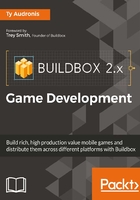
Foreword
At Buildbox, we’re extremely passionate about the creation of games. It is our livelihood, and we believe games themselves to be the ultimate in artistic expression. Video games combine core elements from every major art form. They fuse animations, pictures, technology, and sound into an immersive experience like none other. When you view a painting or watch a movie, you can see a beautiful world on display, but when you play a game, you are inside that beautiful world. You are the hero of that world and you are 100% responsible for their journey. You, as the protagonist, must hone your skills of the game to decide their fate. This immersion causes a very close connection to the games people play; a connection that is much stronger and more emotionally attached than most forms of art. Proof in point—there are many more people with tattoos of The Legend of Zelda than the Mona Lisa. They are both great pieces of art, and the Mona Lisa is arguably more famous, but The Legend of Zelda has definitely affected more people on an emotional level.
If there is one hobby more fun than playing games, it’s creating them. Making the game, testing, tweaking, and finally watching it go live is something only a few will experience, but they will all tell you it’s amazing. This especially rings true if you see strangers playing your game on the subway, or when you watch the facial reactions of your friends playing your game for the first time. There is something truly special about creating joy for others, and games do this in a very special way. When you make games, you are doing more than just creating code. You are creating experiences for other people.
Unfortunately, the problem with creating games is inherent in their design. To create something that is an accumulation of all art is not an easy task, and before Buildbox, options were very limited. In fact, with an estimated 17 million programmers on Planet Earth, only 0.2% of the population could create a game. Our goal with Buildbox was to help the other 99.8% of the people who might be interested. It was a difficult task, but we’ve been very excited to cultivate a new style of software—and an amazing community—over the past 2 years. This journey hit a major milestone a few months ago with the release of Buildbox 2.0. This new version expanded the software in a large way by adding in over 150 new features. Some of these were major additions such as multiple worlds, multiple characters, and an expanded menu system with animations. Other features were more under the hood, but still required to make vastly expanded gameplay.
It’s been a very exciting ride so far, and when Packt Publishing reached out about creating this book, we were excited for two very important reasons. First, we are not only fans of Packt, but also customers. Things have come full circle as the development team here at Buildbox has purchased multiple Packt books in the past to help create various aspects of the software. Second, we understand that while tools are great, you are only as good as your training. With Buildbox, there are many best practices, undiscovered tips, and hidden secrets that can vastly improve your game making experience. Inside these pages, you’ll find all of those and more. The author, Ty Audronis, has an amazing insight into the software regardless of how complex the issue is at hand. Also, our CTO, Nik Rudenko, was the technical editor. Nik single handedly coded the first version of Buildbox and has been instrumental in its success. No human on the planet knows Buildbox better than him.
Finally, there has absolutely never been a better time than right now to make a video game. As of 2015, more people are spending money on video games than movies, music, or TV. The market has matured, the app store is proven, and mobile has won the race. Everywhere you turn people are glued to their phones, looking for the next app to download. What will they download? Will it be your game? There is no reason it shouldn’t be. In the last 18 months, more than 75 Buildbox games have been featured by Apple or broken the Top 100 of the app store. These are games made by regular people—the 99.8% of us that don’t know how to code. With this book and Buildbox, you’ll have all the tools you need to do it yourself. Time to get started.
Trey Smith
Founder of Buildbox